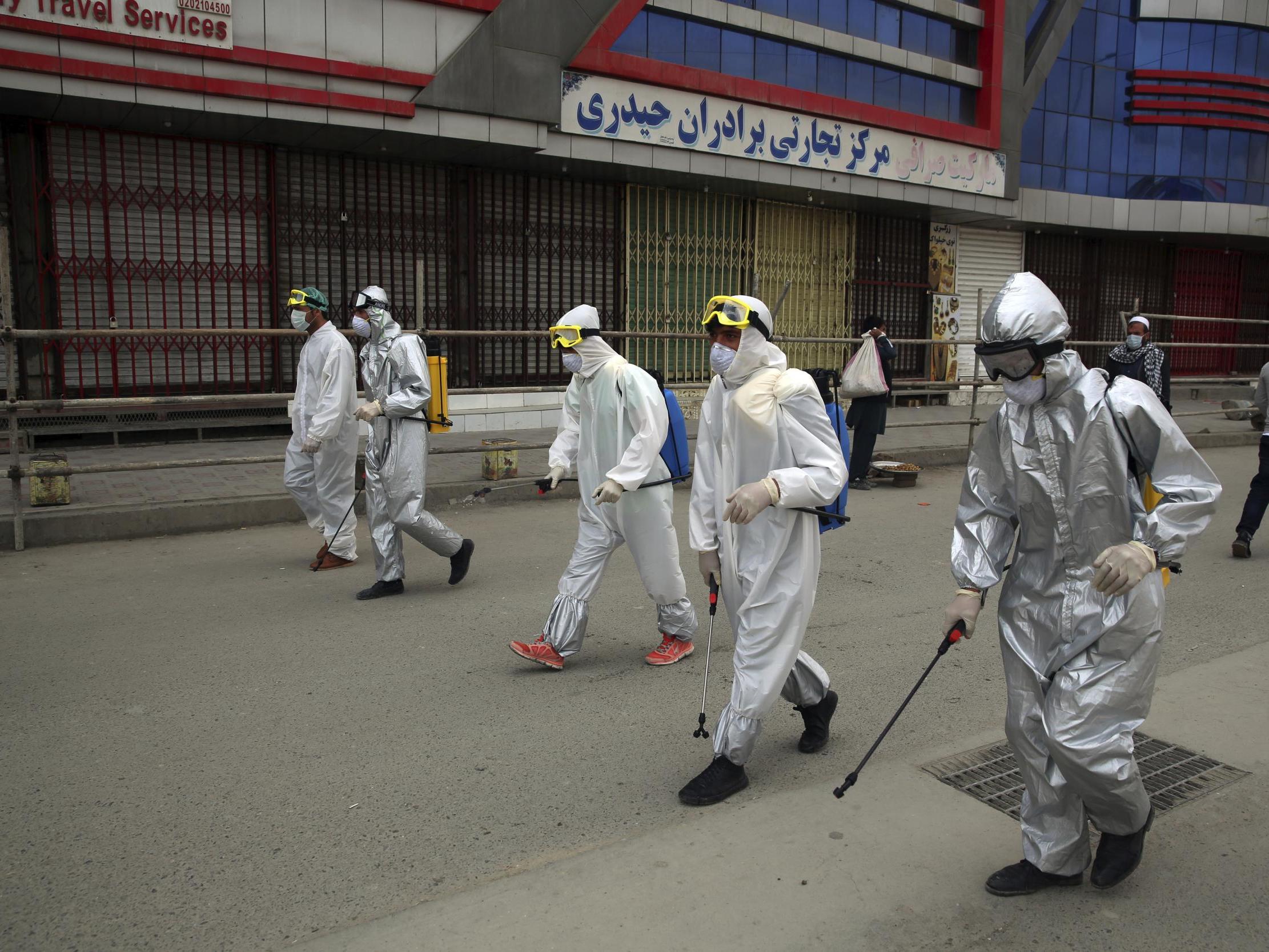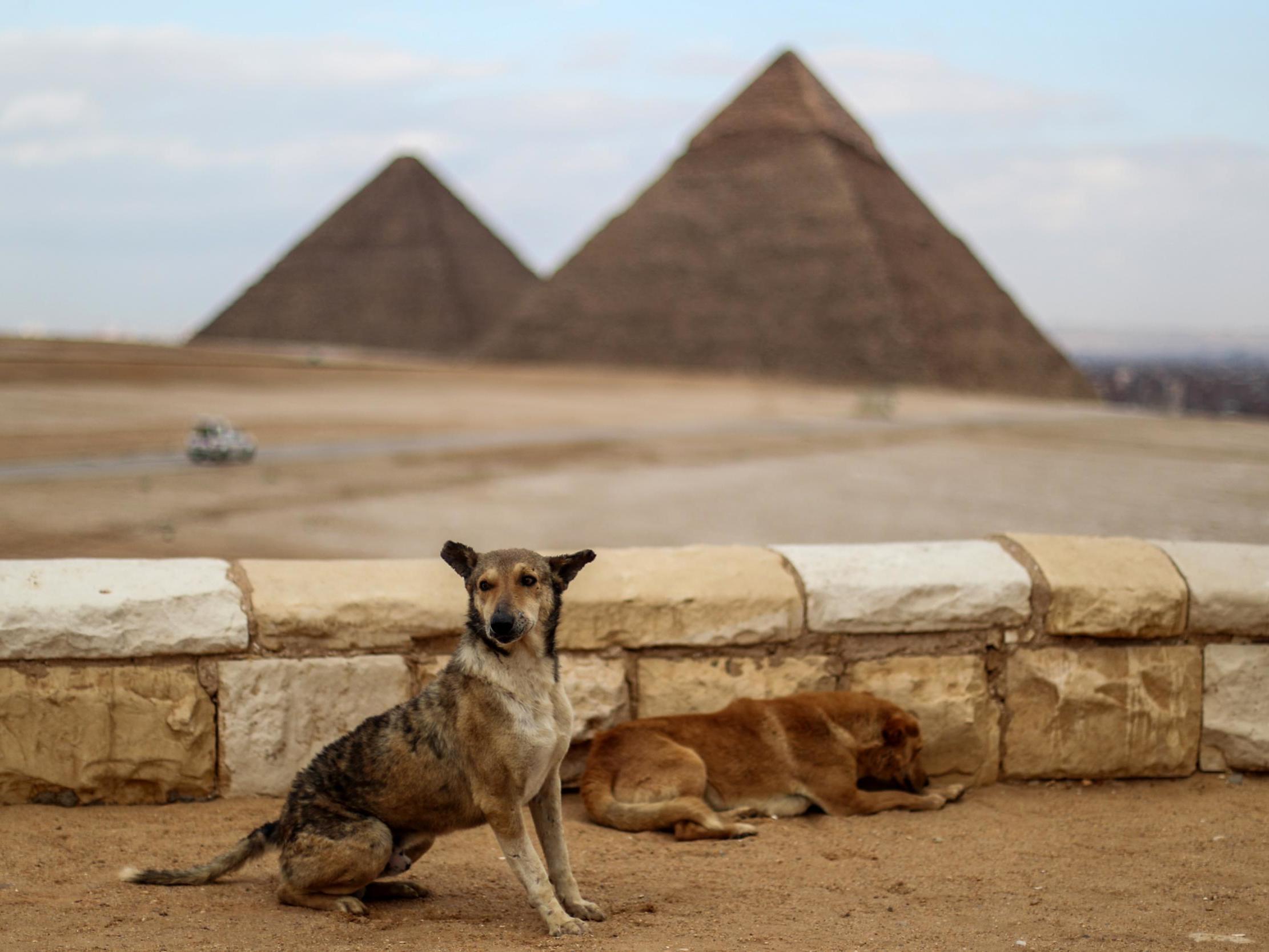Coronavirus: Journalists threatened and detained as multiple countries restrict pandemic coverage
From Latin America to Russia, governments have tried to shape coverage so it avoids criticism or information that authorities deem harmful to public order, report , and

Your support helps us to tell the story
This election is still a dead heat, according to most polls. In a fight with such wafer-thin margins, we need reporters on the ground talking to the people Trump and Harris are courting. Your support allows us to keep sending journalists to the story.
The Independent is trusted by 27 million Americans from across the entire political spectrum every month. Unlike many other quality news outlets, we choose not to lock you out of our reporting and analysis with paywalls. But quality journalism must still be paid for.
Help us keep bring these critical stories to light. Your support makes all the difference.
When a flu-like virus tore through the world, killing tens of millions and infecting far more, the papers in Europe told readers of Spanish flu. King Alfonso XIII of Spain was one of many stricken, they reported in 1918. What they didn’t say was that their own populations were being decimated, too.
It was the largest pandemic in modern history, but due to wartime censorship in many European countries, few citizens would know it at first. Only Spain, a nation neutral in the fight, allowed its press to work largely uncensored, and so it was that stories of the contagion spread too.
A century later, coronavirus is again testing the resilience of independent media around the world as governments exploit concerns over coverage of the epidemic to clamp down on press freedoms.
From Latin America to Russia, governments have tried to shape coverage so it avoids criticism or information that authorities deem harmful to public order. Questioning of official accounts has drawn fines, police investigations and the expulsion of foreign correspondents. In some countries, the virus has provided a pretext for governments to pass emergency legislation that is likely to curb freedoms long after the contagion has been extinguished.
The consequences could amount to life or death, free-press advocates say.
“During a public health emergency, there are extremely strong requirements of governments to provide truthful information to the public so that we as individuals and in our communities can make decisions about what we should be doing,” said David Kaye, the United Nations special rapporteur on freedom of opinion and expression. “That depends on a vibrant press that doesn’t feel that when it reports that it could be subject to intimidation, threats or even criminal sanction.”
In the Middle East, governments have detained or otherwise punished reporters who question the state’s response to the epidemic. Saudi Arabia and the United Arab Emirates have announced fines in the hundreds of thousands of dollars for individuals deemed to be sharing fake news, a fluid term that press advocates have long described as open to abuse by governments seeking to quash scrutiny.
As Iraqi doctors work overtime to contain the spread of the virus, authorities in Baghdad said on Thursday they were temporarily suspending the Reuters news agency’s licence to work, after it published a report suggesting there may be thousands more confirmed cases in Iraq than the figure of 772 provided by the Health Ministry.
Similarly, Egypt said last month that it was revoking the press credentials of The Guardian’s correspondent there, Ruth Michaelson, after she reported on a study by a team of infectious disease specialists, mostly based in Canada, that questioned Egypt’s official number of coronavirus cases. She was forced to leave the country days later.

In Turkey, where the government of president Recep Tayyip Erdogan is one of the world’s leading jailers of journalists, figures are released daily for the number of people who have died or been infected with the virus, as well as the number of tests health officials have conducted. But authorities for weeks kept a tight lid on other information, including the location of cases in Turkey, on the grounds that publicising the information might lead to an exodus from trouble spots and further the spread of the virus.
According to Reporters Without Borders, eight Turkish journalists are now waiting to learn whether they will face charges after prosecutors interrogated them over their Covid-19 reporting.
Some of those detentions smacked of panic. A newspaper owner and editor in the northern Turkish city of Bartin were detained in mid-March for publishing a headline saying a local doctor had tested positive for coronavirus, according to Baris Yarkadas, a former opposition member of parliament who tweeted about the arrests. The two were accused of “inciting the public to panic,” Mr Yarkadas wrote. He added that the charge was “strange,” because the local government confirmed the news about the doctor, about an hour after the journalists were detained.
In many former Soviet countries, repression of journalists, activists and opposition figures has long been stifling, and some governments have used the Covid-19 crisis as a pretext to further tighten control, using bans on “fake news” and disinformation.

Russian media that question official figures or the state’s response to the virus run the risk of steep fines or having their licenses stripped. In Armenia, journalists have complained that officials have forced them to change stories or remove them, while Azerbaijani opposition figures have been arrested for posting criticisms on social media of their government’s handling of the crisis. In Belarus, Sergey Satsouk, director and editor of the news website Ezhednevnik, was arrested in late March, after critical coverage of the government’s handling of coronavirus.
Russian state media watchdog Roskomnadzor has warned against the publication of false information that could “create a threat of massive disruption of public order and public safety.” Several outlets have been ordered to remove reports suggesting that virus cases might be greater than official figures. Individuals convicted of spreading alleged fake news face fines of up to $6,400 (£5,200), and action has been taken against ordinary citizens for social media posts as well.
In Azerbaijan, President Ilham Aliyev is using the crisis to crack down on free speech, amending the country’s information law so website owners are obliged to prevent the publication of “false information” about a wide-ranging list of topics, from the health system to transport networks.
Sir Roger Gale, a rapporteur on Azerbaijan with the Parliamentary Assembly of the Council of Europe, described the government moves as a “shameful exploitation” of the pandemic.
“It beggars belief that any head of state would abuse a public health emergency to tighten his grip on power,” he said.
Echoes of that playbook are being heard around the world. On Saturday, police in the Philippines charged a television station owner and an online reporter under a new law that imposes a punishment of two months in jail or a fine of almost $20,000 (£16,250) for publishing what the government deems false news about the virus.
In Hungary, which has seen at least 525 cases and 20 deaths, prime minister Viktor Orban’s government has handed parliament an emergency bill that would formalise a years-long slide from democracy into dictatorship.
“The emergency bill, more than anything, is about dropping the facade of democracy in Hungary,” said Zselyke Csaky, Freedom House’s research director for Europe and Eurasia.
Submitted last week, it allows the government to declare a state of emergency for as long as Mr Orban sees fit, and punishes those who “distort” or publish “false” information on the outbreak with five years in jail.
The move will likely have devastating effects on what remains of the country’s already embattled independent press, and at a crucial point in a public health crisis, Ms Csaky said. “Perhaps, if we are hopeful, one silver lining could be that once this is over, people realise how important it is to have access to news that one can trust,” she said.
In a letter to Marija Pejcinovic Buric, secretary general of the Council of Europe, Mr Orban dismissed the international criticism, urging critics to read the law itself again. “If you are not able to help us in the current crisis, please at least refrain from hindering our defensive efforts,” the prime minister wrote.
But pro-Orban commentators have publicly joked about critical journalists being arrested and argued that those who criticise the government’s proposed restrictions are siding with the coronavirus.
Hungary is in a “war situation,” the pro-government editor and historian Marton Bekes told viewers on a current affairs show recently. And some opposition outlets, he said, were “openly rooting for the virus.”
In Latin America, journalists are facing similar pressures. Honduras has also declared a state of emergency, withdrawing the legal guarantees for journalists to work without being subjected to “any kind of persecution.”
In Brazil, president Jair Bolsonaro moved to indefinitely extend deadlines for freedom of information requests with a late-night decree that press advocates said would have deprived the public of information at a time when it most needs it.
The country’s supreme court temporarily stayed his decree. (In India, likewise, that country’s supreme court denied a government request that news outlets be ordered to refrain from publishing on the virus without official clearance.)
And in Venezuela, authorities arrested journalist Darvinson Rojas and interrogated him about his reporting on the country’s coronavirus outbreak, at one point suggesting that he was himself infected.
He live-tweeted part of the interrogation.
The Washington Post
Subscribe to Independent Premium to bookmark this article
Want to bookmark your favourite articles and stories to read or reference later? Start your Independent Premium subscription today.
Join our commenting forum
Join thought-provoking conversations, follow other Independent readers and see their replies
Comments